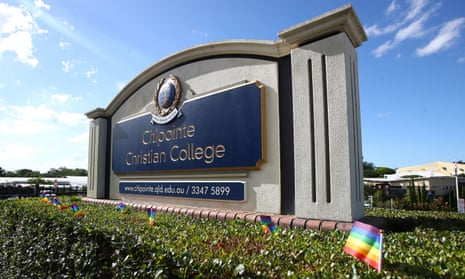A controversial clause used by religious bodies to justify discrimination against transgender, gay and unmarried people should be abolished, a 14-month review into Queensland’s discrimination laws has found.
The state’s human rights commissioner, Scott McDougall, said the Queensland Anti-Discrimination Act currently allows for faith-based schools to discriminate against teachers on the basis of their sexuality, pregnancy, relationship status and gender identity.
In a report tabled in parliament on Thursday, after a comprehensive review of the act, the Queensland Human Rights Commission said the genuine occupational requirement clause should be repealed and a new exemption introduced.
“In terms of the religious exemptions … teachers are exposed to a lot more discrimination [than students],” McDougall said.
“We’ve recommended narrowing that exemption … so that only teachers … involved in direct teaching of the religion can be subject to discrimination, and that discrimination needs to be reasonable and proportionate.”
It comes after Brisbane’s Citipointe Christian College came under fire earlier this year for employment contracts that warned teachers they could be sacked for being openly homosexual.
The contracts appeared to mimic the wording of the “genuine occupational requirement” exception that allows religious bodies to discriminate in circumstances where a person “openly acts in a way that the person knows or ought reasonably to know is contrary to the employer’s religious beliefs”.
QHRC’s proposed exemption would allow religious organisations to only discriminate “on the ground of religious belief or activity … if reasonable and proportionate in the participation of the person in the teaching, observance or practice of a particular religion is a genuine occupational requirement”.
The QHRC also recommended clarifying another clause that has caused controversy and confusion, after Citipointe Christian College sent families enrolment agreements that implied transgender students will only be recognised by their “biological sex”.
“The current law as it exists only enables schools to discriminate on the basis of sex and religion at the point of enrolment,” McDougall said.
“There has been some confusion and there was a very strong response to Citipointe that indicated that contemporary attitudes really have shifted over the years.”
The 420-page report makes 46 recommendations, including replacing the state’s 30-year-old discrimination act by July 2023 in a bid to “eliminate discrimination and sexual harassment”.
The QHRC has called for the repeal of several “redundant exemptions”, including one that allows employers to discriminate against sex workers and gender-diverse and transgender people when working with children.
“The exemption for working with children was clearly outdated and risks perpetuating harmful stereotypes. It’s just not acceptable in today’s world,” McDougall said.
Another clause that the QHRC wants to be overturned enables discrimination on the basis of sexuality when accessing reproductive technology.
after newsletter promotion
The commission also recommended the repeal of an exemption that allows accommodation providers to lawfully discriminate against sex workers if there is a “reasonable belief” that they are engaging in sex work on the premises.
Along with the repeal of these exemptions, the QHRC has recommended five additional attributes to be protected under the act – sex characteristics, irrelevant criminal record, physical features, subjection to domestic or family violence and homelessness.
The commission said a “positive duty”, requiring organisations and businesses to take reasonable and proportionate steps to prevent discrimination, should be introduced.
“The expectation that victims of discrimination should carry the burden of having to bring complaints … I think is both unfair and a really ineffective way of responding to discrimination,” McDougall said.
“There was a really strong call from the community for the commission to play a much more proactive role in addressing discrimination, and the introduction of a positive duty would enable that.”
Queensland’s attorney-general, Shannon Fentiman, said the government will “carefully consider” the recommendations.
“It has been over 30 years since the Goss government introduced Queensland’s Anti-Discrimination Act. At the time, the legislation was groundbreaking, but three decades on, our society is a different place with different values,” Fentiman said.
Fentiman said the actions of Citipointe Christian College “highlighted the importance of having specific protections for LGBTIQ+ students and staff at religious schools”.
